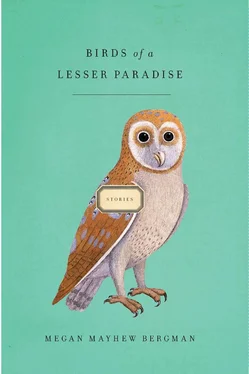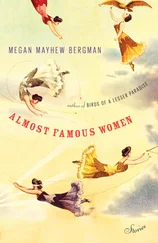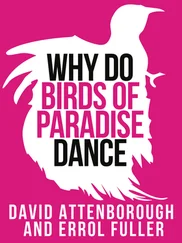TOPICS & QUESTIONS FOR DISCUSSION
1. How much of a role does nature play in the lives of the heroines of Mayhew Bergman’s stories? How do their relationships with the natural world affect their decisions?
2. Whether it is an African Gray parrot or a lemur, animals are central to each of these stories. How do the characters identify with or distinguish themselves from animals? Do any of the characters share certain qualities with the animals described?
3. In “Housewifely Arts,” what did her mother’s parrot represent to the narrator while her mother was still alive? How did the parrot’s importance change after her mother passed away?
4. How did you react to the veterinarian husband in “The Cow That Milked Herself” examining his pregnant wife in the same way he examines animals? Do you think his clinical take on his wife’s pregnancy reveals any universal truths about motherhood?
5. “For centuries people had used the swamp to hide from their problems,” says the narrator of the title story. Does Mae use the swamp to hide from her own problems? If so, how? How does her father’s scare in the swamp change her priorities?
6. Lila feels ugly and damaged after her face is disfigured in “Saving Face,” and goes to great lengths to isolate herself. How do you think her experience with Romulus and the sickly calf will change her? Can she reclaim the person who she was, despite her new challenges?
7. Lauren, the population control activist in “Yesterday’s Whales,” has a crisis of faith when she becomes pregnant. Have you ever experienced an event that’s challenged your long-held convictions? Is there any way to reconcile two wildly different points of view?
8. Do you think the narrator of “Another Story She Won’t Believe” realizes the mess she’s made? What do you think propelled her to self-destruct? Do you think her treatment of the lemurs represents an insurmountable character flaw?
9. What does it take to forgive yourself after an act of negligence? What kind of mother do you think the narrator of “The Urban Coop” will turn out to be, if she can become pregnant?
10. “My mother once told me: Never underestimate avoidance as an effective coping mechanism,” says the narrator of “The Right Company.” Is her retreat to the small Southern town of Abbet’s Cove an effective way to deal with the collapse of her marriage? When she tries to free Mussolini’s dog, the animal refuses to make an escape. What does this juxtaposition say about the narrator’s circumstances?
11. In “Night Hunting,” a young girl must come to terms with her mother’s declining health. How does her walk through the cold Vermont night force her to confront her fears? Do the ever-threatening coyotes represent a more primal danger than her mother’s cancer?
12. Could a hunter and an animal lover ever have a functional relationship? Do you think the woman in “Every Vein a Tooth” uses her relationship with animals to avoid the messiness of human intimacy? Or does her extreme devotion to the animals she rescues come from a purer, more optimistic place?
13. “The Artificial Heart” is the only story in Birds of a Lesser Paradise that’s set in the future. How do you think it fits in with the rest of the stories in the collection? Do you think it’s a natural impulse to want to prolong life, even if the quality of that life becomes less than ideal? Or do we become lesser versions of ourselves if we try to cheat death?
14. The narrator of “The Two-Thousand-Dollar Sock” is a fighter, as is her husband, and ultimately her dog, Vito, who attacks a bear to protect the family. Do you think humans have a similar compulsion to fight and defend?
ENHANCE YOUR BOOK CLUB
1. Find a local animal shelter where all members of your book club can volunteer and have some fun in the process.
2. The swampland setting of the story “Birds of a Lesser Paradise” is exotic, but bird-watching is a fun pastime that can be done just about anywhere. Get a few pairs of binoculars and head into the great outdoors — record what you see and cross- reference with a bird-watching guidebook.
3. “The Right Company” takes place mostly in a mom-and-pop restaurant in Eastern North Carolina, where the narrator’s food writer friend explores Southern comfort food with glee. Prepare your own Southern-inspired comfort food and invite your book club over for a meal!
A CONVERSATION WITH MEGAN MAYHEW BERGMAN
YOU LIVE WITH A VARIETY OF ANIMALS ON A SMALL FARM IN VERMONT, AND YOUR HUSBAND IS A VETERINARIAN. HOW HAVE YOUR INTERACTIONS WITH ANIMALS INFORMED YOUR WRITING OF THESE STORIES?
Interacting with animals draws me into a physical world, which is where I want to be. I’ve always been an animal person, and my husband is basically an enabler — now I can get access to all the one-eyed cats and neurotic beagles I want. In fact, we kind of maintain a secular, downtrodden version of Noah’s ark in our farmhouse. But instead of beautiful beasts, we have decrepit, incontinent dogs, rescue goats, and vicious cats marauding around.
My husband can break my heart any day with shop talk. I spend time in the clinic with him after hours, and when I leave, each patient weighs on me. How did the cat with liver failure end up? What choice did the owner make about the old lab with the lung tumor? There is constant tension in his work, an ethical dilemma around every corner. That, in addition to our emotional investment in companion animals, is the stuff narrative is made of. Love, choice, grief, change.
YOU’RE CLEARLY AN ANIMAL LOVER, BUT YOU ALSO WRITE EXTENSIVELY ABOUT THE MENACE OF ANIMALS — OFTEN IT CAN’T BE HELPED, IT’S THEIR NATURE. DO YOU THINK HUMANS ALSO HAVE A WILD, BRUTAL SIDE?
I’m attracted to, and interested in, primal innocence. I think it’s a quality animals and children share.
When I was writing this collection, I was grieving the death of my mother-in-law and acclimating to life with my first child. The following questions often occurred to me: What will we do for survival? The protection of our offspring? I’m fascinated by the primal self — though we operate in an industrialized society, I figure our bodies and minds haven’t evolved at the same breakneck pace. I think vestiges of our animal selves bubble up more than we realize. Are our drives and needs really that different from those of our ancestors?
I have a background in anthropology, which I can never manage to shake. When someone brings me a casserole, I can hear my professor’s voice: there is no such thing as altruism. Or if I get lost driving, I think: that’s okay, Megan, your female predecessors stayed near the yurt and gathered berries. Your brain wasn’t designed for complex navigation. (The feminist in me quickly raises an objection.)
And there you have my interior dialogue… a messy business.
HAS MOTHERHOOD IMPACTED YOUR UNDERSTANDING OF THE NATURAL WORLD, AND IF SO, HOW HAS THAT INFLUENCED YOUR WRITING?
The act of having children did not completely agree with my environmental and feminist beliefs, yet I determined it would be biologically and emotionally satisfying. And it was, which wreaked havoc with my belief system. Suddenly 95 percent of my being was directed to promoting my child’s welfare. The other 5 percent mourned my loss of freedom, and in between feedings I was growling at my husband, mumbling lines from de Beauvoir’s The Second Sex.
Motherhood is a whopping dose of humility. It takes you out of your head and puts you back into the world; you must invest in others. There is less time, in the early years, to dwell on bleaching your teeth or promoting your work.
Nothing, I think, returns you to your body more than childbirth. It’s a violent, primal act, and sublime. My heightened awareness about potentially dangerous people and objects in my peripheral vision made me feel downright animal. The urge to protect my children at all costs permeates every moment of my life. Motherhood does something strange to the self; it makes you a little wild. The urge to exist and persist is a struggle all living things share — this idea is at the heart of all my stories.
Читать дальше












